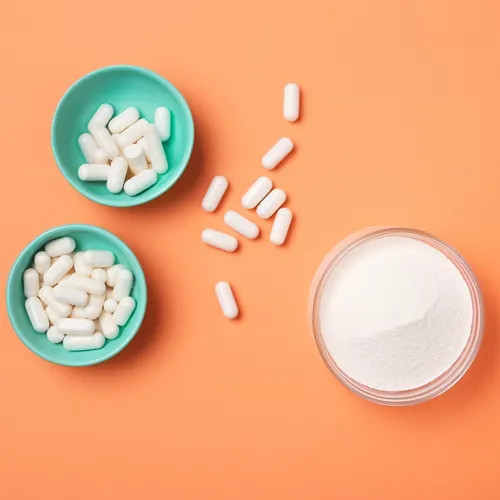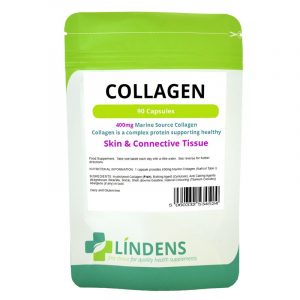Keeping Collagen Levels Up for Healthy Skin and Beyond
Collagen is a structural protein that plays a key role in skin health and elasticity. As we age, our bodies produce less collagen, which can lead to skin wrinkling and sagging. Collagen levels also naturally decline due to UV exposure from the sun, smoking, and pollution.
What Does Collagen Do?
Collagen molecules act as scaffolding to provide support and structure to the skin. It also gives skin strength and flexibility. By keeping skin cells bonded together, collagen helps maintain skin’s plump, youthful appearance. As well as benefitting the skin, collagen contributes to bone, joint, muscle and heart health.
Collagen is found throughout the body, but is most abundant in the skin, bones, tendons, ligaments, blood vessels and digestive system. Within the skin, collagen works alongside elastin and other compounds in the connective tissue (dermis) layer to give it thickness, strength and flexibility. The collagen matrix in the dermis layer forms a sturdy scaffolding structure, which our skin cells can latch onto. This keeps them bonded together tightly.
Collagen Production and Skin Ageing
The natural decline of collagen as part of the ageing process is normal. However, some lifestyle factors can accelerate collagen breakdown. These include poor diet, nutrient deficiencies, digestive issues, restrictive eating, smoking, excess alcohol, sun overexposure and stress. The good news is you can take steps to reduce collagen depletion.
Diet and Lifestyle Tips to Boost Collagen
Focusing on diet and nutrition is key for supporting natural collagen synthesis. Your body combines amino acids from the protein-rich foods you eat to produce its own collagen supply. Foods highest in amino acids include meat, fish, eggs, beans, nuts, seeds and bone broth.
Vitamin C is also crucial, as it enables collagen fibre formation. Get your vitamin C from citrus fruits, peppers, leafy greens and berries. Supporting nutrients like zinc and copper also help.
Alongside eating collagen-boosting foods, stay hydrated, manage stress levels, exercise moderately, sleep well and avoid smoking to keep your collagen levels up.
Do Collagen Supplements Like Powders and Drinks Work?
The collagen supplement market is huge, with powders and liquids claiming to deliver youthful, wrinkle-free skin. Reviews are mixed on absorbing collagen topically through creams. Supplements in oral capsule, powder or liquid form may be more effective.
Lindens Marine Collagen capsules are a good choice of supplement for those who want to try using collagen in capsule form.
Hydrolysed collagen, which breaks the collagen peptides down further into amino acids, results in 90-100% digestion and absorption rates. This optimised form is easier for the body to use. Unhydrolyzed collagen is not broken down, so absorption rates are lower at under 40%. Hydrolysed marine collagen from fish skin, scales and bones may also be easily absorbed.
Studies show collagen peptides are absorbed into the bloodstream intact when ingested, increasing skin elasticity and hydration while reducing fine lines. Bovine, porcine and marine collagen from fish, eggshells and chicken cartilage are common.
Are Collagen Supplements Safe?
Research suggests daily collagen supplementation between 2.5g and 10g is generally safe and effective. However, some people may experience side effects like fatigue, fuller muscles, joint ache, bad taste and heartburn. Those with allergies must check the source.
Speak to your doctor before taking supplements if you have any medical conditions or take medication. While they show promise for skin, hair and nails, collagen supplements should not replace a balanced diet.
The Takeaway
While the cosmetics industry heavily promotes collagen creams and supplements for anti-ageing, few studies conclusively prove they reverse skin damage and wrinkles. A healthy, balanced diet containing plenty of amino acid and vitamin C sources remains the number one way to maintain your body’s natural collagen production. Manage lifestyle factors and avoid collagen degradation for youthful looking skin as you age.
Photo “Collagen” by Anthony Cunningham for Zoom Health
Zoom Health is a leading UK supplier of Home Health Tests and Earplugs






